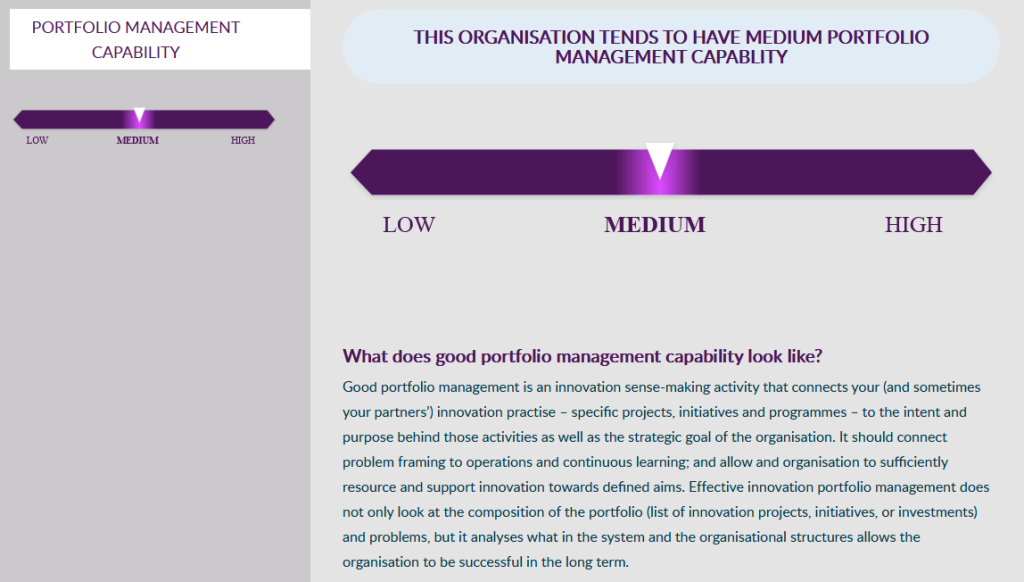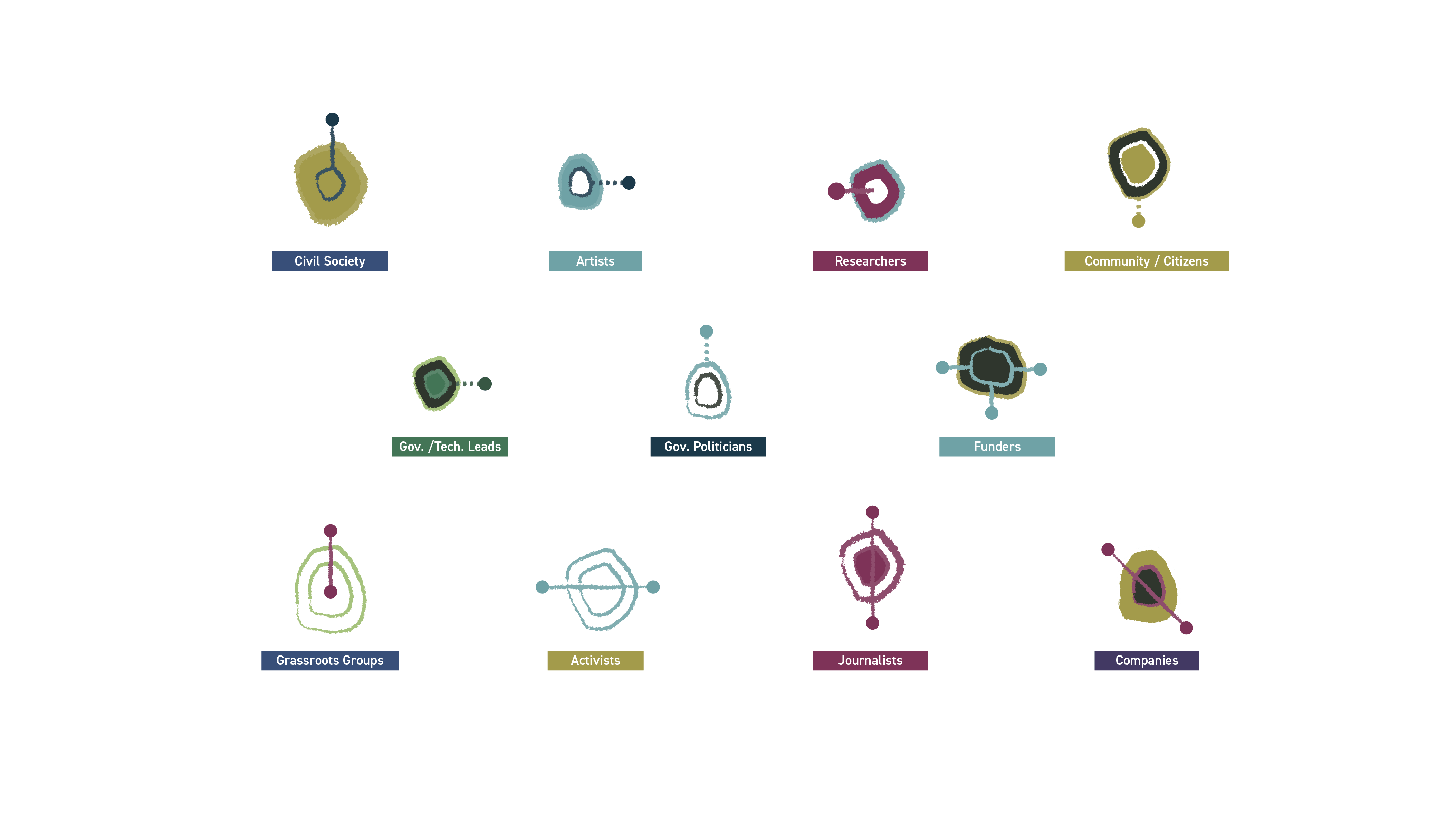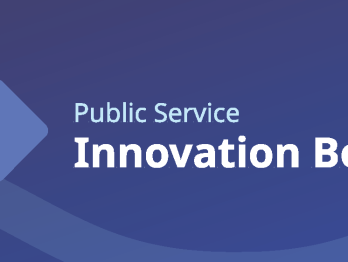Innovation Portfolios: Examples from Practitioners

How do you manage a variety of innovation projects, with differing types of innovation, different goals, and perhaps different teams and funders? To avoid dealing with a mere list of projects, practitioners have recently become interested in innovation portfolio approaches.
What we mean by innovation portfolios
Portfolio management is an analysis and sense-making activity connecting innovation practice – specific projects, initiatives, and programmes – to the intent and purpose behind those activities as well as the strategic goal of the organisation. It should connect problem framing to operations and continuous learning. Effective innovation portfolio management does not only look at the composition of the portfolio (list of innovation projects, initiatives, or investments) and problems, but it analyses what in the system and the organisational structures allows the organisation to be successful in the long term.
While there is currently much excitement for portfolios in the innovation community (see, for instance, this curated collection of readings), there are few publicly available insights into the motivations, practices, challenges, and lessons learnt from those who already have experimented with conscious portfolio management. In OPSI’s work on portfolios, we want to close that gap and interviewed pioneers in this field in a wide variety of organisational contexts. For example, we interviewed various city-level organisations (city of Helsingborg, Chicago, Lund), regional or national-level (10X investments in the US, Mexiro in Mexico) and those operating internationally (Democratic Society, EIT Climate KIC). We conducted a series of interviews with these organisations to ask them for insights they would like to share with the community. You will be able to read the main takeaways from these interviews in our innovation report (funded by Horizon 2020), which will be presented at OPSI’s annual conference, Government Beyond Recovery taking place in Slovenia from 18-19 October 2021.
To our delight, we found that OPSI’s four facets of innovation model is a critical part of portfolio thinking for some of these organisations. Innovation has many ‘facets’ or aspects, each of which can look quite different and can involve different things with differing aims. You can read more about OPSI’s work on the many facets of innovation here. Certain types of innovation, such as adaptive and anticipatory innovation, are more likely to be ignored and underestimated by traditional funding mechanisms. Conceptualising one’s innovation activities holistically through the lens of a portfolio may help to identify such gaps and biases and help understand options towards balancing one’s portfolio. OPSI’s Portfolio Exploration Tool is designed to do exactly that: test one’s innovation model and critically reflect on the balance of one’s portfolio.

Early insights on innovation portfolios in practice
Let us highlight two cases that taught us something new about what portfolios can achieve.
10 X investments is a US-based organisation that works to drive innovation projects in the public sector. 10X is an especially interesting case due to their unique approach to managing the process of selecting, developing, and scaling of innovation investments. Around twice a year 10X has a call for ideas and asks all federal employees in the US to take a blank piece of paper and write what problem they are trying to solve. This low barrier approach uses knowledge from employees and can avoid chains of command that may complicate the communication of such insights. 10X uses several criteria to select projects. They aim for moonshots and transformational ideas, but accept that often such ideas require more seed funding than 10X investment can supply. Thus, feasibility is a second aspect. 10X also accepts that failure is a normal and essential part of the problem,as long as failing takes place fast and some progress is achieved by failing. Even promising projects may be shut down early on, thus the selecting standards for the continuation of projects is quite high.
Another interview partner, Democratic Society, a Brussels-based network of people working to create democracy for the 21st century, made the connection between participative democracy and portfolio management. Democratic Society is a design partner in the multi-city, multi-year EIT Climate-KIC Healthy, Clean Cities Deep Demonstrations project. They have developed a Democratic Climate Model to show the impact of putting citizens at the centre of local climate action. By including different community members (experts, civil society organisations), they shifted the conversation to longer term debates and discussions beyond a project cycle approach. In this way, a portfolio approach can incorporate a shift to more democratic processes and decision-making. It may also help to prevent polarisation and encourage taking an intersectional lens on many issues, for example by considering a broader set of challenges in the design process.

There are many more insights we gathered, especially on the challenges encountered and lessons when managing a portfolio. OPSI is currently compiling a state-of-the-art research report on innovation theory and practice, sourcing knowledge from academic literature on different kinds of innovation and governance, as well as insights from the world of policy on what works and what doesn’t. It draws together various strands of OPSI’s work, for example on anticipatory innovation, adaptive innovation, and mission-oriented innovation policy. A chapter on the theory and practice of innovation portfolio management will feature many of the insights we drew from these interviews. Stay tuned!
We are grateful for all our interview partners who were extremely kind in giving their time to share their experience. We hope to benefit the wider innovation and policy community by making their advice accessible to all in our forthcoming report. Here are innovation community members who are practicing some form of innovation portfolio management and who have contributed cases, examples, insights, and lessons learnt to our forthcoming report.
- Province of Gipuzkoa
- Future by Lund
- Sitra (Finland)
- City of Helsingborg (Innovation Unit)
- EIT Climate KIC
- City of Chicago (Office of Innovation)
- Mexiro
- Democratic Society
- 10X Investments (General Services Administration, USA)
- Kansas University Center for Public Partnerships and Research)
- Viable Cities (Sweden)
- And more!
Sign up for OPSI’s newsletter now to receive regular updates on our work, and the Government Beyond Recovery conference (18-19 October 2021) for our upcoming report on innovation portfolios!









